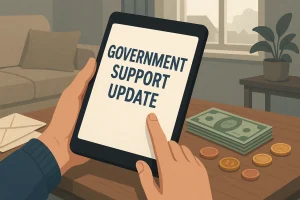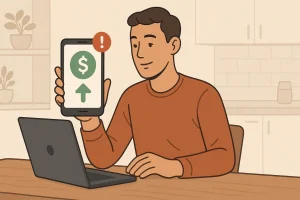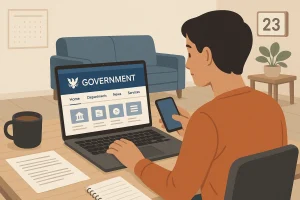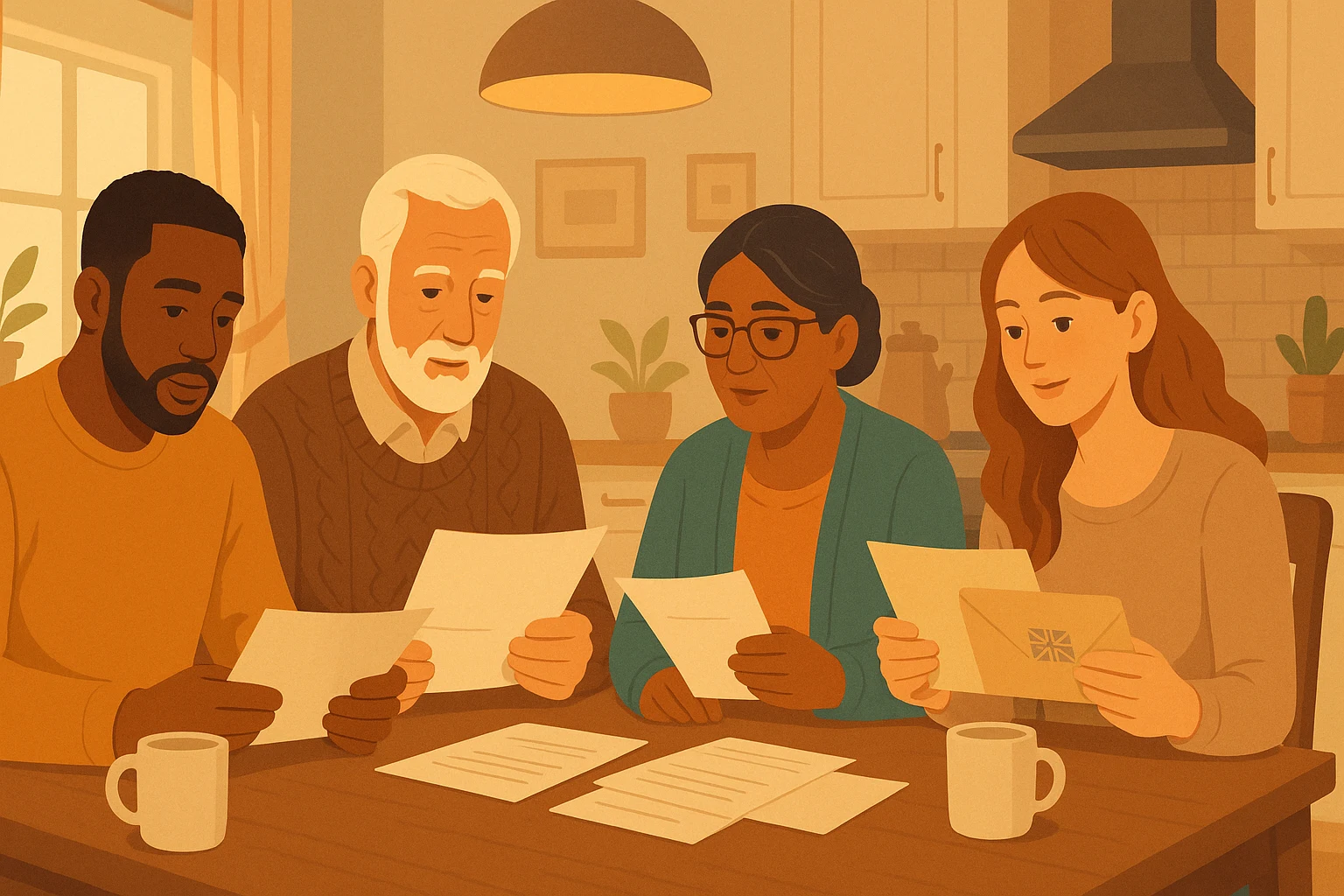Table of Contents
ToggleIs the UK government planning a new support scheme for struggling households? Could a one-off £480 Universal Credit payment be the next cost of living support initiative from the Department for Work and Pensions (DWP)? These are the questions being asked by thousands across the UK as speculation grows around a potential new payment aimed at vulnerable individuals and low-income families.
While there has been no official confirmation from the DWP, reports suggest that a new support payment may be on the horizon. Here’s what we know so far, who may qualify, and how this payment could make a difference as households continue to battle rising costs.
What Is the Rumoured £480 Universal Credit Payment?

The £480 Universal Credit payment refers to a potential one-off payment being considered by the Department for Work and Pensions (DWP). Though not yet officially announced or confirmed by government sources, multiple media outlets and benefit support forums have highlighted growing speculation that such a payment could be introduced to support those on the lowest incomes during the difficult winter period of 2025.
This reported payment would come as part of ongoing efforts by the UK government to help ease financial burdens caused by ongoing economic challenges, including inflation, rising rent costs, and energy price surges. Over the past three years, the DWP has launched several similar payments, with the most recent being a £299 cost of living payment in early 2024.
The rumoured £480 amount would make this one of the largest single cost of living payments ever issued in the UK under Universal Credit support, offering vital relief to eligible households.
Why Might the Government Introduce Another Payment?
Although inflation has cooled slightly compared to previous years, the economic landscape remains challenging for millions of people across the country. Food prices are still high, energy bills are expected to spike again in winter, and real wages for many have failed to keep up with living costs.
The government has been under continued pressure from social policy experts and charities such as Citizens Advice and the Joseph Rowntree Foundation to implement further targeted support for those most at risk of falling into poverty. These groups include:
- People with disabilities or health conditions preventing them from working
- Single parents managing childcare costs on a single income
- Those in temporary accommodation or unstable housing
- Individuals juggling multiple part-time jobs on zero-hour contracts
The introduction of a £480 support payment would demonstrate a continued commitment to assist those facing the greatest financial challenges and would follow the structure of past DWP cost of living schemes.
Who Could Be Eligible for the £480 Payment?
While there has not yet been a formal eligibility list published, leaked discussions and comparisons to previous DWP schemes offer clues about who might qualify if this support becomes reality.
It is expected that eligibility would centre around Universal Credit claimants. According to preliminary reports, individuals receiving Universal Credit during a specific assessment period, likely to be October 2025, could be considered eligible for the payment.
This qualifying period aligns with the timeframes used in earlier cost of living payments, where claimants needed to be receiving benefits during a specific month to be eligible.
The DWP is also said to be reviewing additional criteria to target the most vulnerable, including income thresholds and work capability assessments. Although details remain unconfirmed, a proposed eligibility structure might resemble the following:
| Criteria | Likely Requirement |
| Benefit Type | Universal Credit, possibly income-based ESA or JSA |
| Assessment Period | October 2025 (rumoured) |
| Earnings | Low or no earnings during the qualifying month |
| Residency | Must be a UK resident during the qualifying period |
| Sanctions | Those with active sanctions may be excluded |
It’s important to note that receiving Universal Credit does not guarantee eligibility. Individuals with higher earnings or recent changes in their benefit status may not qualify under the rumoured criteria.
How Would the £480 Payment Be Issued?

If the DWP confirms the scheme, the £480 payment is likely to be automatically issued to those who meet the criteria, without requiring any application. This follows the same model used in previous cost of living support packages, where eligible claimants received payments directly into their bank accounts.
The process would typically involve:
- Identifying eligible claimants based on benefit records for the qualifying month
- Issuing a notification via Universal Credit online journals or official DWP letters
- Making the payment as a standalone deposit, separate from regular Universal Credit payments
No additional paperwork or application is expected, and claimants would be advised to monitor their accounts and journal entries for updates.
It is expected that payments would be rolled out between late November and mid-December 2025, aligning with increased financial pressure around winter energy bills and the Christmas period.
How Would This Payment Compare to Previous DWP Support?
The proposed £480 amount stands out as significantly higher than earlier individual payments offered by the DWP. The table below outlines recent cost of living support provided by the government and how this potential payment would compare:
| Year | Payment | Recipient Groups | Notes |
| 2022 | £650 | Universal Credit, legacy benefits | Paid in two instalments |
| 2023 | £900 | Low-income households | Split across three instalments |
| 2024 | £299 | Final confirmed cost of living payment | One-off, issued in Spring |
| 2025 (rumoured) | £480 | Universal Credit and vulnerable claimants | Not yet confirmed |
The increased amount suggests that the government is responding to continuing demands for more substantial aid, particularly as many low-income households face accumulated debts and increased borrowing due to years of financial strain.
How Could This Payment Help Struggling Households?
A one-off payment of £480 could have a significant impact on recipients’ ability to manage household expenses during the colder months. For families, single adults, carers, and disabled individuals on limited incomes, the extra cash injection could cover essential needs such as:
- Heating bills during colder periods
- School-related expenses such as uniforms and meals
- Grocery costs for larger households
- Outstanding rent arrears or council tax payments
Consider the following scenarios:
Lauren, a single mother of three in Liverpool, works part-time and receives Universal Credit. With rising heating bills and school-related costs, an extra £480 could help her clear her outstanding utility balance and purchase winter clothing for her children.
Darren, a full-time carer for his elderly mother in Newcastle, receives Carer’s Allowance alongside Universal Credit. A support payment could help him manage medical supply expenses and heating costs for their home.
Saeed, a jobseeker in Bristol receiving Universal Credit and recently moved into supported accommodation, could use the payment to furnish his new living space and stock up on food staples.
What Should Claimants Do to Stay Informed?

Until the DWP issues an official statement, the payment remains speculative. However, staying informed is essential to avoid missing out on any confirmed support. Claimants are encouraged to:
- Regularly log in to their Universal Credit account and review journal messages
- Ensure their contact details and bank information are up to date
- Check reputable government websites like GOV.UK and DWP press releases
- Seek guidance from Citizens Advice or welfare rights organisations
While many unofficial sources may circulate rumours or misinformation, always rely on trusted platforms for the most accurate updates.
Conclusion: What Should You Expect Next?
While the £480 Universal Credit payment is not yet confirmed, the ongoing conversation suggests that the UK government is seriously considering additional financial support for vulnerable households this winter. If introduced, the payment would be among the most generous one-off schemes the DWP has ever rolled out.
For now, staying up to date through official channels, checking your Universal Credit journal, and ensuring all your personal and banking details are correct is the best course of action.
As the cost of living crisis continues, even unconfirmed rumours like this one offer hope to many who feel left behind. Whether this support materialises or not, the need for stronger, ongoing financial safety nets remains clear
Frequently Asked Questions About the £480 Universal Credit Payment
Is the £480 payment officially confirmed by the government?
No. As of now, the payment has not been confirmed by the DWP or any government agency. Reports remain speculative, though many believe an announcement is forthcoming.
What is the qualifying month for the payment?
The qualifying month is expected to be October 2025, though this has not been officially announced. This would follow the same model used in previous DWP payments.
Will all Universal Credit recipients receive this payment?
Not necessarily. Eligibility may depend on income levels, sanction status, and whether benefits were received during the qualifying period.
Will I need to apply for the £480 payment?
No application is expected. If the payment is approved, it will likely be issued automatically to those who meet the criteria.
Will this payment affect my existing benefits?
No. Cost of living payments from the DWP have previously been non-taxable and did not affect regular benefit payments.
What if I think I’m eligible but don’t receive it?
If the payment is confirmed and you believe you meet the criteria but did not receive it, you should contact DWP or consult Citizens Advice for support in raising a query.
Is this payment a replacement for future benefit increases?
No. This would be a one-off payment. It does not replace long-term increases in benefits, which are subject to annual review.




